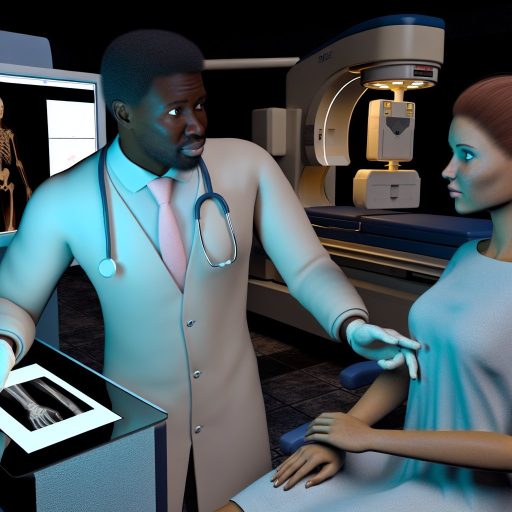Introduction
Biomedical technology refers to the application of engineering and technology principles to healthcare to improve disease management.
In Nigeria, where healthcare infrastructure is limited, the role of biomedical technology is crucial in improving disease management.
The current state of healthcare in Nigeria faces challenges such as limited access to healthcare facilities, lack of medical equipment, and shortage of healthcare professionals.
Disease management is often hindered by these constraints, leading to poor health outcomes.
Integrating biomedical technology into healthcare systems in Nigeria is essential to overcome these challenges.
By leveraging advanced technologies such as diagnostic tools, medical imaging equipment, and digital health solutions, healthcare providers can enhance their ability to diagnose, treat, and manage diseases effectively.
Challenges in Biomedical Technology in Nigeria
Limited funding hinders research and development in biomedical technology.
Infrastructure inadequacies impede the advancement of biomedical technology in Nigeria.
Complex regulatory processes delay the approval and implementation of new technologies.
There is a shortage of trained professionals in the field of biomedical technology.
Limited awareness about the benefits of biomedical technology hinders its adoption in Nigeria.
Traditional beliefs and practices may impede the acceptance of new technologies.
Opportunities for Growth in Biomedical Technology in Nigeria
As the healthcare sector grows, there is a high demand for innovative biomedical technologies.
Partnerships with international organizations can provide access to expertise and resources.
Increasing government initiatives and funding can boost the development of biomedical technology.
Investing in education and training can address the shortage of skilled professionals.
Collaboration between public and private sectors can drive innovation in biomedical technology.
Successful Initiatives in Biomedical Technology in Nigeria
The use of advanced imaging technologies has improved diagnosis and treatment outcomes.
Remote healthcare services have expanded access to medical expertise in underserved areas.
Institutions conducting cutting-edge research have made significant contributions to healthcare advancements.
Mobile applications are being used to monitor health conditions and deliver personalized care.
AI algorithms are being deployed to analyze medical data and accelerate drug discovery processes.
Biomedical Technology in Disease Management in Nigeria
Biomedical technology has revolutionized disease management in Nigeria in several ways.
From early detection to treatment and monitoring, the impact of these advancements cannot be overstated.
Early Detection
Biomedical technology plays a crucial role in early disease detection in Nigeria.
Sophisticated diagnostic tools and imaging techniques aid in early identification of diseases.
Screening programs utilizing technology help in identifying potential health issues before they escalate.
Diagnosis
Biomedical technology has significantly improved disease diagnosis in Nigeria.
Precision medicine is made possible through advanced genetic testing and molecular diagnostics.
Automated laboratory equipment enhances accuracy and speed in diagnosing various illnesses.
Treatment
Biomedical technology has revolutionized the treatment of diseases in Nigeria.
Targeted therapies developed through biotechnology offer personalized treatment options.
Robotic surgical systems improve surgical outcomes and reduce recovery times for patients.
Monitoring
Biomedical technology enables effective monitoring of diseases in Nigeria.
Wearable devices and remote monitoring tools help in tracking patients’ health status.
Electronic health records streamline data management and facilitate continuous monitoring of disease progression.
Case Studies
In Nigeria, the use of telemedicine technology has improved access to healthcare in remote areas.
The introduction of point-of-care testing devices has expedited disease diagnosis and treatment.
Genomic sequencing technology has enabled better understanding of diseases prevalent in Nigeria.
Biomedical technology has had a profound impact on disease management in Nigeria.
Transform Your Career with Expert Guidance
Get personalized mentorship consulting that’s tailored to your unique path. Our expert advice is actionable and exclusive.
Get StartedFrom early detection to personalized treatment options, these advancements are enhancing healthcare outcomes.
This technology is improving the quality of life for individuals in the country.
As the field continues to innovate, the future looks promising for disease management in Nigeria.
You Might Also Like: Innovations in Nigerian Anaesthesiology
Importance of Collaboration in Biomedical Technology
In the field of biomedical technology, collaboration is crucial for progress and development.
By working together, healthcare providers, researchers, policymakers, and technology developers can achieve remarkable results in advancing healthcare solutions in Nigeria.
Need for Collaboration
- Pooling expertise and resources
- Combining different perspectives
- Enhancing problem-solving capabilities
- Promoting innovation and creativity
- Increasing efficiency and effectiveness
It is evident that the complex nature of healthcare challenges in Nigeria requires a multidisciplinary approach.
Collaboration ensures that various stakeholders bring their unique strengths to the table, leading to comprehensive solutions that address diverse needs.
Benefits of Interdisciplinary Collaboration
- Improved healthcare outcomes
- Enhanced disease management strategies
- Streamlined patient care processes
- Increased access to innovative technologies
- Promotion of evidence-based practices
When healthcare providers, researchers, policymakers, and technology developers collaborate, they can leverage their expertise to create impactful interventions.
This coordinated effort can revolutionize disease management practices and elevate the quality of healthcare delivery.
Successful Collaborations in Biomedical Technology
Several successful collaborations in biomedical technology have been observed both within Nigeria and with international partners.
These partnerships have led to groundbreaking advancements in healthcare and disease management.
- University-Industry Partnerships: Academic institutions and industry players collaborate to drive research and development in healthcare technologies.
- Public-Private Partnerships: Government agencies team up with private companies to leverage resources and expertise for healthcare solutions.
- International Collaborations: Nigerian researchers collaborate with international institutions to access cutting-edge technologies and global best practices in biomedical research.
These collaborations have resulted in the development of innovative medical devices, diagnostic tools, treatment protocols, and healthcare delivery systems.
They have transformed healthcare practices in Nigeria.
By fostering partnerships and cooperation, the biomedical technology sector can propel advancements that benefit the population.
These efforts contribute to improving the overall healthcare landscape in the country.
Delve into the Subject: Prosthesis Innovations and Advances in Nigeria
When it comes to utilizing biomedical technology in disease management in Nigeria, there are several ethical considerations that must be taken into account.
Ethical implications play a crucial role in guiding the use of such advanced technologies in the healthcare sector.
Patient Privacy
- Protecting patient privacy is paramount when implementing biomedical technology.
- Ensuring that patient data is kept confidential and secure is essential.
- Healthcare providers must adhere to strict privacy regulations to safeguard patient information.
- Unauthorized access to patient records can lead to breaches in confidentiality.
Data Security
- Securing data is critical to prevent data breaches and cyber-attacks.
- Healthcare facilities must invest in robust cybersecurity measures to protect patient data.
- Regular monitoring and updating of security protocols are necessary to stay ahead of potential threats.
- Training staff on data security protocols can help prevent lapses in data protection.
Access to Healthcare Resources
- Equitable access to healthcare resources is a key ethical consideration.
- Ensuring that all patients have access to cutting-edge biomedical technologies is crucial.
- Addressing disparities in resource allocation can help bridge the gap in healthcare access.
- Policymakers need to develop strategies to ensure fair distribution of healthcare resources.
Informed Consent
- Obtaining informed consent from patients before using biomedical technology is essential.
- Patients must be fully informed about the risks and benefits of the technology.
- Healthcare providers must ensure that patients understand the implications of using such technology.
- Respecting patient autonomy and decision-making is paramount in obtaining consent.
Healthcare professionals and policymakers in Nigeria must navigate these ethical dilemmas with care and consideration.
By prioritizing patient privacy, data security, equitable access to healthcare resources, and obtaining informed consent, the use of biomedical technology can be utilized effectively and responsibly in disease management in Nigeria.
Explore Further: Preventive Dentistry: Regular Check-ups Matter

Future Prospects and Trends in Biomedical Technology
As we look towards the future, there are several exciting developments and advancements in biomedical technology that could have a significant impact on disease management in Nigeria.
Predicted Developments
- Advancements in telemedicine will revolutionize access to healthcare services, particularly in remote areas.
- Personalized medicine will become more prevalent, tailoring treatments to individuals based on their genetic makeup.
- AI-driven diagnostics will enhance the accuracy and efficiency of disease detection and analysis.
- Wearable health technology will enable continuous monitoring of vital signs and early detection of health issues.
Potential Impact on Disease Management
These trends have the potential to reshape healthcare delivery and disease management practices in Nigeria in several ways.
Improved Access to Healthcare
Telemedicine will enable patients in underserved areas to consult with healthcare professionals remotely, reducing barriers to access.
Personalized Treatments
Personalized medicine will ensure that patients receive treatments that are tailored to their specific needs, improving overall outcomes.
Enhanced Diagnostics
AI-driven diagnostics will allow for faster and more accurate disease identification, leading to earlier interventions and better prognosis.
Continuous Monitoring
Wearable health technology will provide real-time data on patients’ health status, allowing for proactive disease management and prevention.
Reshaping Healthcare Delivery in Nigeria
These trends have the potential to transform the healthcare landscape in Nigeria, making healthcare more accessible, personalized, and efficient.
The future of biomedical technology holds great promise for improving disease management in Nigeria, with advancements in telemedicine, personalized medicine, AI-driven diagnostics, and wearable health technology leading the way towards a healthier and more efficient healthcare system.
Explore Further: Top Dental Schools in Nigeria: A Comprehensive Guide
Implications of Biomedical Technology in Nigeria
After exploring the role of biomedical technology in disease management in Nigeria, it is evident that integrating these advancements is crucial for improving healthcare outcomes.
The key points discussed include the potential of technology to enhance diagnosis, treatment, and monitoring of diseases.
Furthermore, the importance of investing in research and collaboration to further develop these technologies cannot be overstated.
It is imperative for stakeholders in the healthcare sector to prioritize the integration of biomedical technology to address the healthcare challenges in Nigeria.
By encouraging further research, investment, and collaboration, we can pave the way for more effective disease management strategies and ultimately improve the overall health of the population.
Therefore, continued efforts and investments in biomedical technology are essential to drive innovation and revolutionize disease management in Nigeria.
Let us work together towards a future where advanced technology plays a central role in ensuring better health outcomes for all Nigerians.
Additional Resources
A critical evaluation of Nigeria’s response to the first wave of COVID …




